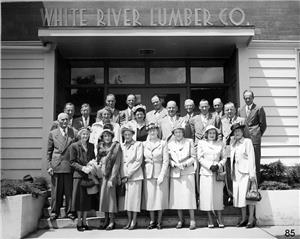In 1897, Carl M. Hanson and his sons Axel, Charles, and Frank, along with Louis Olson and Alexander Turnbull (who was Scottish), purchase a burned-out mill in Enumclaw, located in the foothills of the Cascade Range some 50 miles southeast of Seattle. They found the White River Lumber and Shingle Company.
The company specialized in finished lumber -- Douglas-fir, western hemlock, and red cedar -- that would be showcased in many of Enumclaw's finely crafted homes. The railroad transported the lumber to every state, but mostly to the Midwest where the name "White River" meant high quality.
The Hansons were Swedish immigrants who had worked their way across the country as laborers. They pooled their earnings in order to establish their own business. Within a decade the White River Mill employed 500 people.
Their operation in Enumclaw prospered, and became the largest employer on the plateau. The Hansons and Olson prevented Enumclaw from becoming a "company town" like many so-called "mill towns." Rather than forcing workers to be indebted to a company store, they encouraged them to buy their own homes. They participated actively in community organizations and supported local businesses and civic improvements.
Eventually, the White River Lumber Company merged with the Weyerhaeuser Company, the largest employer in the region.

